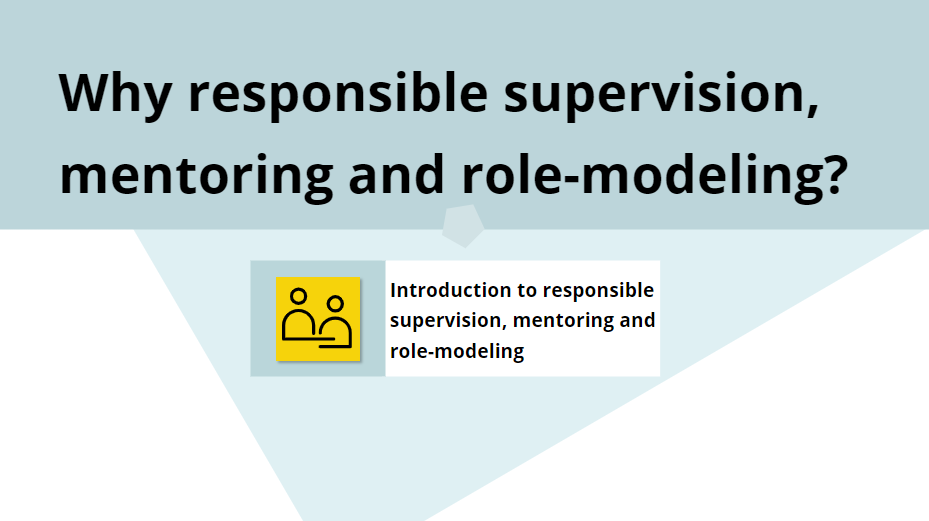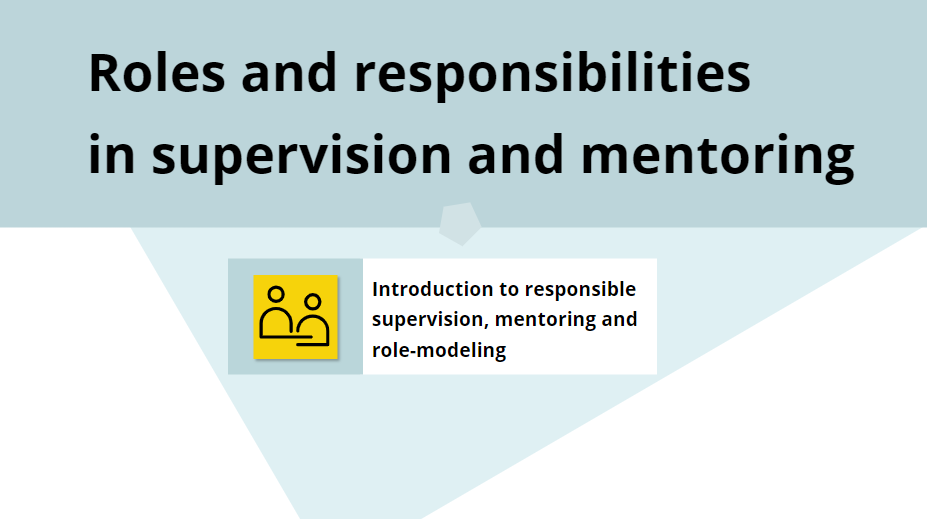Difference between revisions of "Instruction:D3ee617b-5d9b-4c47-a015-030b0354c9d2"
| Line 27: | Line 27: | ||
{{Instruction Perspective Trainee | {{Instruction Perspective Trainee | ||
|Is About=By taking these eLearning modules you will learn about and reflect on: Responsible supervision, mentoring and role-modeling. | |Is About=By taking these eLearning modules you will learn about and reflect on: Responsible supervision, mentoring and role-modeling. | ||
| + | |||
| + | * '''General responsibilities:''' You will be introduced to the general responsibilities that can apply to everybody who is enrolled in research, regardless of the role. | ||
| + | * '''Roles:''' You will be introduced to the different roles in a research environment and their corresponding responsibilities. | ||
| + | * '''Virtue Ethics approach:''' Virtue ethics will be applied to supervision, mentoring and role-modeling with some interactive exercises | ||
| + | * '''Role-modeling:''' You will be introduced to the concept of role-modeling, the responsibilities of a role model and how it can influence research practice and culture. | ||
|Important Because=Supervision, mentoring, and role-modeling have a strong influence on research work environments. If a research environment is not open or is unsafe, researchers are less likely to raise concerns or admit mistakes. Therefore, contributing to an open, safe and responsible research environment is important to reduce problems such as poor mental health, drop-outs, fraudulent practices, discrimination, and harassment. For this reason, responsible and good supervision, and mentoring might be seen as duties of care to reduce and signal problems. | |Important Because=Supervision, mentoring, and role-modeling have a strong influence on research work environments. If a research environment is not open or is unsafe, researchers are less likely to raise concerns or admit mistakes. Therefore, contributing to an open, safe and responsible research environment is important to reduce problems such as poor mental health, drop-outs, fraudulent practices, discrimination, and harassment. For this reason, responsible and good supervision, and mentoring might be seen as duties of care to reduce and signal problems. | ||
|Has Practical Tips=There are subtitles available. You may enable them by clicking on "CC" at the lower left corner of the player. | |Has Practical Tips=There are subtitles available. You may enable them by clicking on "CC" at the lower left corner of the player. | ||
Revision as of 13:49, 14 June 2021
Introduction to responsible supervision, mentoring and role-modeling
This is one of a four part series. The other three series are: "Introduction to Research Integrity" , "Introduction of Virtue Ethics to Research Integrity" and "Virtue ethics under current research conditions.
You should have experience of research in practice (e.g. be employed as a researcher) or be a trainer/educator/teacher who has had experience in research in the past.
VIRT2UE Online modules privacy statement
This privacy statement concerns the VIRT2UE online modules. The modules are part of the VIRT2UE training program. They are produced by the VIRT2UE consortium and made freely and openly available on the Github platform.
All information of users remains client side
At no point during the use of the VIRT2UE online modules is any personal information collected or saved. Information entered into the modules remains ‘client side’ and is not sent back to servers, nor made available for use by third parties.
Entering personal information in the modules
At some places in the modules the user is invited to type input in open fields. Information entered into these fields is not sent back to any server. None of the entered information can be traced back to the user. It is not obligatory to use these fields. Users can also choose to document their responses elsewhere, for instance on paper.
Contact us if you have any further questions.What is this about?
By taking these eLearning modules you will learn about and reflect on: Responsible supervision, mentoring and role-modeling.
- General responsibilities: You will be introduced to the general responsibilities that can apply to everybody who is enrolled in research, regardless of the role.
- Roles: You will be introduced to the different roles in a research environment and their corresponding responsibilities.
- Virtue Ethics approach: Virtue ethics will be applied to supervision, mentoring and role-modeling with some interactive exercises
- Role-modeling: You will be introduced to the concept of role-modeling, the responsibilities of a role model and how it can influence research practice and culture.
Why is this important?
Practical Tips
There are subtitles available. You may enable them by clicking on "CC" at the lower left corner of the player.
Please note that no information will be saved or stored after you have closed the browser window/tab. This has two major implications: (1) Whenever you close your browser window/tab, your progress will not be saved and you will have to start the module anew. It is not necessary to complete the course in one go, but recommended to leave the browser window/tab open (and the computer/laptop running). (2) In case you aim to save your reflections, you are kindly asked to copy/paste your input in a separate document and save it on your computer, BEFORE you submit your input (A print-out solution is planned, but is not available yet).Why responsible supervision, mentoring and role modeling?
This module highlights the importance of good and responsible supervision, mentoring and role-modeling in research environments. Such practices, create open and safe environments where problems like poor mental health, anxiety, discrimination and harassment and fraudulent practices might be reduced.

Roles and responsibilities in supervision and mentoring
This module explores the different roles and corresponding responsibilities in research environments, allowing the researchers to recognize themselves in such roles and responsabilities. Besides, a virtue ethics approach is applied to supervision, mentoring and role-modeling with some interactive exercises.

Remarks
List of contributors:
Armin Schmolmüller
We thank Rosemarie Bernabe, Fenneke Blom, Birgit Buschbom, Ana Sofia Carvalho, Natalie Evans, Nicole Föger, Laura Hartman, Teodora Konach, Erika Löfström, Franca Marino, Ana Marusic, Signe Mezinska, Bert Molewijk, Daniel Pizzolato, and Guy Widdershoven for their constructive feedback during the process of developing!
This training has been developed by the VIRT2UE project, which has received funding form the European Union’s H2020 research programme under grant agreement N 741782.What is this about?
Why is this important?
Practical Tips
There are subtitles available. You may enable them by clicking on "CC" at the lower left corner of the player.
Please note that no information will be saved or stored after you have closed the browser window/tab. This has two major implications: (1) Whenever you close your browser window/tab, your progress will not be saved and you will have to start the module anew. It is not necessary to complete the course in one go, but recommended to leave the browser window/tab open (and the computer/laptop running). (2) In case you aim to save your reflections, you are kindly asked to copy/paste your input in a separate document and save it on your computer, BEFORE you submit your input (A print-out solution is planned, but is not available yet).Why responsible supervision, mentoring and role modeling?
This module highlights the importance of good and responsible supervision, mentoring and role-modeling in research environments. Such practices, create open and safe environments where problems like poor mental health, anxiety, discrimination and harassment and fraudulent practices might be reduced.

Roles and responsibilities in supervision and mentoring
This module explores the different roles and corresponding responsibilities in research environments, allowing the researchers to recognize themselves in such roles and responsabilities. Besides, a virtue ethics approach is applied to supervision, mentoring and role-modeling with some interactive exercises.

Remarks
List of contributors:
Armin Schmolmüller
We thank Rosemarie Bernabe, Fenneke Blom, Birgit Buschbom, Ana Sofia Carvalho, Natalie Evans, Nicole Föger, Laura Hartman, Teodora Konach, Erika Löfström, Franca Marino, Ana Marusic, Signe Mezinska, Bert Molewijk, Daniel Pizzolato, and Guy Widdershoven for their constructive feedback during the process of developing!
This training has been developed by the VIRT2UE project, which has received funding form the European Union’s H2020 research programme under grant agreement N 741782.
